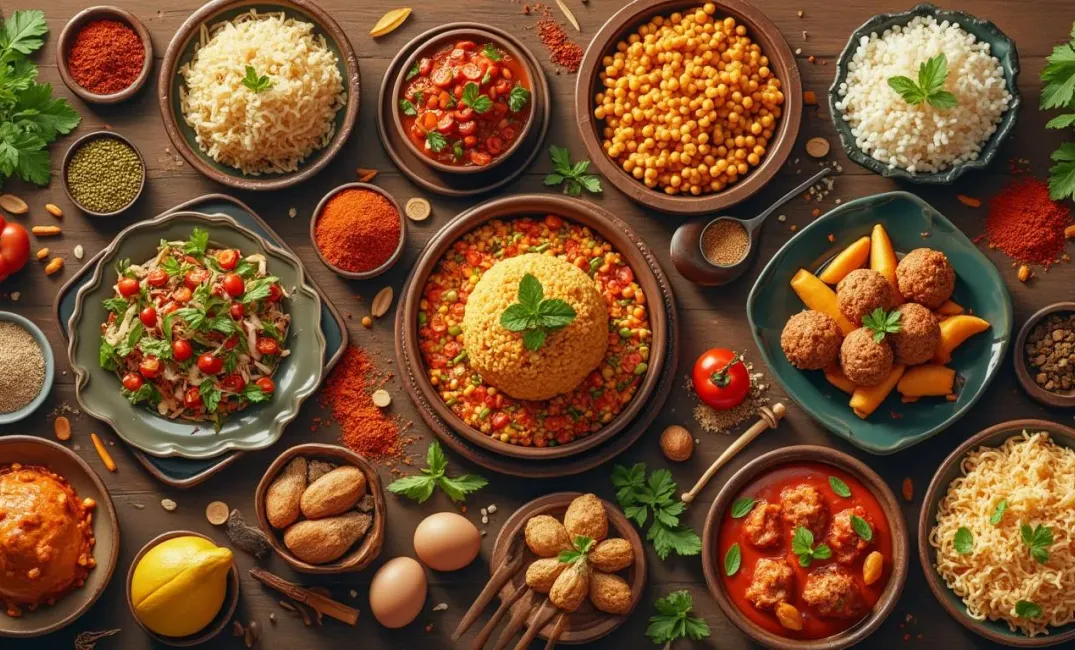Introduction: Culinary Arts as Cultural Expression
"Tell me what you eat, and I will tell you who you are." — Jean Anthelme Brillat-Savarin
Human cuisine represents a symphony of flavors and traditions that spans millennia, reflecting the diversity and ingenuity of cultures worldwide. As an integral part of our heritage, culinary arts serve not just as nourishment for the body but as a profound cultural expression, connecting generations and communities. Today's exploration delves into the rich tapestry of global culinary traditions, highlighting their historical roots, cultural significance, and innovative evolution.
The Evolutionary Foundations of Human Cuisine
Origins of Diet and Early Culinary Practices
- Hunter-Gatherer Beginnings: The dietary foundation of early humans was shaped by their hunter-gatherer lifestyle, utilizing locally available plants, fruits, and hunted animals. This rudimentary but diverse diet laid the groundwork for later culinary sophistication.
- Agricultural Revolution: The domestication of plants and animals marked a turning point, leading to settled communities and steadily increasing the complexity of diets. Staples like wheat, rice, and maize became the bedrock of regional dishes.
The Culmination of Techniques and Tools
- Culinary Innovations: Over time, culinary techniques such as fermentation, baking, and preservation emerged, driven by necessity and innovation. Each technique not only enhanced flavor but also extended the longevity and nutrition of food.
- Development of Cooking Tools: The creation of cooking tools and utensils signifies an essential progression in culinary practices. From stone hearths to clay ovens, these advancements enabled humans to explore more complex cooking methods.
The Cultural Significance of Food Across Civilizations
Cuisine as Cultural Identity
- Culinary Symbols: In many societies, food acts as a powerful symbol of cultural identity, conveying values, beliefs, and history. Each cuisine nurtures a unique story, binding individuals and communities through shared meals and traditions.
- Festivals and Feasts: Food plays a central role in celebrations and religious rituals worldwide. Traditional feasts act as vehicles for cultural transmission, preserving heritage while adapting to new influences.
Culinary Diplomacy and Exchange
- Cross-Cultural Influences: The Silk Road, maritime trade, and exploration facilitated the exchange of ingredients and cooking techniques, creating fusion dishes that enrich global culinary landscapes. Spices from Southeast Asia fundamentally altered European palates, a testament to the enduring influence of cross-cultural exchange.
- Gastronomy as Diplomacy: Cuisine also functions as a form of soft diplomacy, fostering connections between different cultures through shared culinary experiences, often opening doors to dialogue and understanding.
Ingredients and Innovations: A Palette of Possibilities
Transformative Ingredients
- Staple Grains and Their Impact: Grains such as rice, wheat, and corn serve as foundational ingredients in many global dishes. Their abundance and nutritional value have allowed civilizations to flourish, reflecting the role of these ingredients in the development of complex culinary techniques.
- Spices and Flavors: Spices have historically been as valuable as gold, shaping culinary traditions and global trade. The pursuit of spices expanded horizons, contributing to the cultural and economic exchanges that molded modern societies.
Modern Culinary Innovation
- Globalization and Fusion: Contemporary cuisine embraces fusion, blending traditional methods with new flavors and ingredients, creating innovative dishes that reflect globalization's multifaceted nature.
- Technological Advancements: The advent of molecular gastronomy, sous-vide techniques, and culinary engineering reflect humanity's endless quest for creativity in the kitchen. Such innovations continue to redefine the boundaries of taste and presentation, transforming dining experiences.
The Role of Cuisine in Health and Sustainability
Nutritional Perspectives
- Traditional Wisdom and Modern Insights: Traditional diets often emphasize balance and holistic wellbeing. Scientific inquiry into these practices offers insights into nutritional value and health benefits, fostering a harmonious relationship between past wisdom and modern science.
- Dietary Trends: Contemporary culinary trends often reflect a return to natural ingredients and sustainable practices. Movements like the organic and locavore initiatives advocate for closer connections between people and the source of their food.
Sustainability and Culinary Ethics
- Sustainable Practices: As global consciousness grows, ethical considerations in food production and consumption become pressing concerns. Sustainable fishing, regenerative agriculture, and zero-waste policies canonize responsible stewardship of resources.
- Culinary Activism: Chefs and cooks around the world advocate for sustainable food systems, raising awareness of issues like food insecurity, supply chain ethics, and dietary cultural preservation, aligning cuisine with broader ecological and ethical concerns.
Conclusion: A Universal Table of Flavors
"Food is our common ground, a universal experience." — James Beard
Human cuisine is a testament to the enduring nature of culture and innovation. From ancient hearths to futuristic kitchens, each meal encountered on this journey serves as an expression of identity, artistry, and community. As humanity seeks to extend its reach beyond Earth, the culinary lessons of diverse traditions and sustainable practices will remain invaluable, guiding our efforts to nourish the mind, body, and spirit.
As we savor the flavors of imagination and tradition, may we continue to cherish cuisine's rich legacy—a universal table where history, creativity, and connection enrich our shared experience. Across galaxies, let the harmony of culinary arts remind us of the bonds that tie us to our roots and to each other.
TRADITION, GASTRONOMY, GLOBAL CULINARY TRADITIONS, INNOVATION, FOOD HISTORY, FOOD DIPLOMACY, CULTURE, CUISINE, SUSTAINABILITY, CULINARY ARTS

